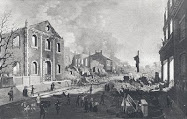Howard Golden, Who Led, and Defended, Brooklyn, Dies at 98
Howard Golden, who as Brooklyn borough president for a quarter-century pressed to strengthen the borough economically and defended it against slights real or perceived in the years before it experienced a gentrifying revival, died on Wednesday at his home in the Kensington section of Brooklyn. He was 98.
His death was confirmed by his daughter Michele Golden.
A brash, blunt and savvy product of the Brooklyn Democratic machine, Mr. Golden, whose clipped and gravelly tones often conveyed caustic criticisms of those who crossed him, doubled as the Democratic Party leader in Brooklyn during seven of his 25 years as borough president.
The party post made him a kingpin in determining who would get party backing in legislative and judicial primaries in Brooklyn, a heavily Democratic borough where winning the Democratic nomination was usually tantamount to being elected.
A reduction of the borough presidents’ powers occurred midway through Mr. Golden’s tenure, a result of a municipal reorganization approved by voters in 1989. The change abolished the Board of Estimate, which had been one of the city’s two top policy-making bodies, along with the City Council, and which comprised the mayor, the Council president, the city comptroller and the five borough presidents.
The board had the power, along with the City Council, to approve the city’s budget and, without the Council, to determine the use of city-owned property and enter into contracts on behalf of the city. Having a vote in those key decisions had given borough presidents most of their governmental power.
Mr. Golden was vehement in opposing the abolition of the board, which had been proposed by a commission appointed to recommend revisions of the City Charter.
When the commission held a public hearing in Brooklyn to discuss its proposals, Mr. Golden did not mince words. “As an act of courtesy, I welcome you to Brooklyn,” he told the commissioners. “I must say that your visit here today is not a beneficial one.”
It was undisputed, however, that changes in how the city was run had to be made. The United States Supreme Court had ruled that the Board of Estimate’s voting structure was unconstitutional, because it violated the one-person, one-vote principle by allotting one vote to each borough president even though the populations of the boroughs varied widely in size.
Read the rest of the obituary here:
https://www.nytimes.com/2024/01/24/nyregion/howard-golden-dead.html




No comments:
Post a Comment